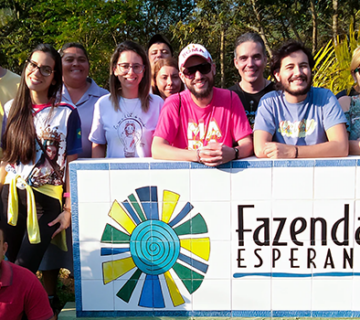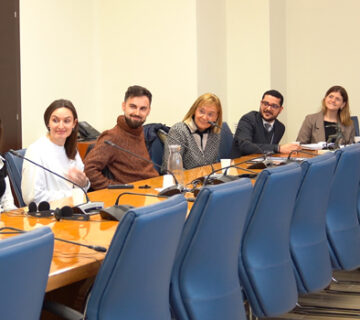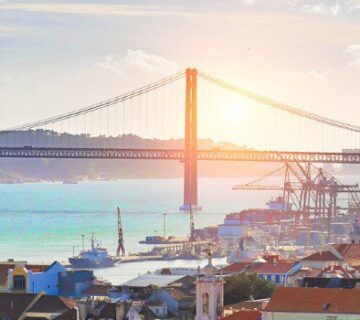A group of Focolare youth from Singapore – made up of Europeans and Indonesians – went to the province of Aceh, in northern Sumatra, Indonesia. Here are some excerpts of their travel journal:
Our trip’s aim was to see the needs of the stricken areas personally, so as to understand what the local members of the Focolare Movement could do concretely for the victims of the tidal wave. It was an unforgettable experience. We had gone there to give, but we received much, much more. Seeing us return, some people had the impression that we were coming back from a pilgrimage to a sacred place.
Ours was a varied group: Singaporeans, Indonesians, a few Europeans; Christians, Muslims, and persons without any particular religious affiliation. We went together to that mosaic of cultures which is Indonesia.
The king’s granddaughter
At Aceh, a local couple joined our group to be our guides; the woman was Indonesian and the man British. The woman’s grandfather was the last king of Sigli, a province situated in the eastern part of Aceh. It was providential that they had joined our group because they opened many doors for us.
On our way to Aceh, A., whom we familiarly called “Princess” – being the king’s granddaughter – told us something about her family. “Aceh has had several sultanates or kingdoms until half-a-century ago. My grandfather ruled over one of them; he was the “Rajah” (king) of Sigli. He was assassinated in 1950 when Indonesia gained independence from the Dutch and formed a single nation of the archipelago’s 16,000 islands.”
From then on, an armed group called GAM (Movement for a Free Aceh) became organized. It fights for the independence of the region through continuous guerrilla warfare. The frequent conflicts between the regular Indonesian army and the armed guerrillas create insecurity and tension among the people. Aceh has therefore come to be considered as a danger zone, more unknown than loved, more an object of prejudice than a sign of common nationality.
During our stay there we discovered, instead, that the inhabitants of Aceh are truly our brothers, endowed with great spiritual riches.
A meeting with suffering and life
We met a host of people: children, religious, teachers, policemen, people who live in the tent cities. We met the fishermen, who more than others, suffered from the disaster because the tsunami had destroyed their boats and fishing nets. As we listened to their life stories and heard of their necessities, we felt an overwhelming sense of dismay in the face of so much suffering and so much need. But we went on peacefully, bearing in mind that Jesus in our neighbor might one day say to us: “I needed a boat and a fishing net to start life over again, and you got them for me.” The people’s generosity was surprising: they set aside their own sufferings to take care of complete strangers. A young boy cut down some coconuts from the tree to offer each one of us an exquisite drink.
Weeping together
In Kampung Cina village, we met a young Muslim woman who was going there to see her house for the first time after the disaster. It was razed to the ground. He had lost her husband and her 8 children! In tears, she told us that as she was fleeing with her few month old child in her arms, she suddenly saw her two other children in danger and went back to help them. Just then she heard the cry of her baby, whom she lost hold of, being carried away by the water. Another huge wave came and carried her two other children away. As the water flowed back to the sea, she lost consciousness and when she came back to her senses, she found herself on top of a coconut tree. We listened, unable to move: it was impossible to utter even a single word. Not knowing how to comfort her, we embraced her and wept with her.
When we entered the worst-stricken area and the surrounding villages, we encountered absolute desolation! Houses completely emptied by the water’s violence, mostly destroyed and covered by mountains of ruins, from which victims were still being carried out.
When it was impossible to retrieve a body, a flag was placed as a sign that someone was buried there; it was a sort of makeshift funeral, a sign of respect for those lives that should not simply be forgotten.
Along the road going to the center of the city, about 3 kilometers away from the sea, two huge ships (350 tons each) were rigged out to serve as hotels. They will remain as a monument in memory of this tragedy.
The sharpest suffering, however, was seeing the extreme tip of Banda Aceh, where the fury of the sea lashed out in all its vehemence, striking from all directions and devastating everything. The area is a peninsula surrounded by water. All that remains was the flooring of the houses, together with a heap of ruins. There was no sign of life.
We traveled for two hours in silence by car. Maybe you could consider it a prayer, a meditation, a sharing in a suffering that could only be expressed with “why?” We recognized all this as a countenance of Jesus forsaken on the cross – of him who took upon himself all the sufferings, divisions and traumas of humanity. This assured us, even though it was a mystery, that beneath it all was his personal love for everyone.
Rolling up our sleeves
We then tried to get to work: one of us is employed in a company which manufactures fishing nets, so could do something about the fishermen’s problem. We made our calculations – how much materials were needed to make so many nets; how much did it take to make the wooden boats, possibly equipping them with an engine as well; how many bicycles would be needed to get the children to school; how much was needed for school supplies; how much money was required in all?
Now we have come back, better equipped to organize the distribution of the goods we had collected, since we knew the needs and the faces of the people behind these needs (we had come in contact with 953 fishermen).
We felt we had built a family with everyone, made up of people of all different backgrounds. And this was just the beginning!
We had the impression of watching the miracles of the solidarity which the tsunami awakened all over the world. We witnessed the generosity of various groups, non-government organizations, faith-based organizations and so on. There is a place for everyone who wants to help! The motto of Indonesia’s coat-of-arms is: “Unity in diversity.” It seemed to us that this immense country, after the terrible trial, was closer to unity.


 Italiano
Italiano Español
Español Français
Français Português
Português


